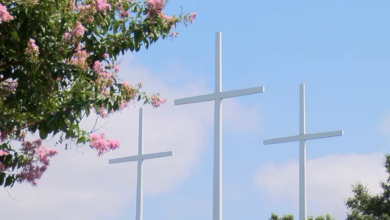Mexican indigenous group upholds customs through Holy Week syncretic rituals

By Daniel Sanchez
Hermosillo, Mexico, Apr 6 (EFE).- The Yaqui indigenous people take to the streets in this capital of the northwestern Mexican state of Sonora in masks and costumes for a unique religious celebration, a tradition that dates back more than 400 years and serves to reassert their rights to their land and ancient customs.
A product of that group’s migration to Hermosillo from the countryside, these Lenten and Holy Week rituals are a syncretism of Catholicism with the Yaquis’ own cosmovision.
Alejandro Aguilar Zeleny, a researcher at the National Institute of Anthropology and History, told Efe that the Yaquis reenact the Passion of Christ with ceremonies that fuse their ancestral culture with beliefs instilled by Jesuit and Franciscan missionaries.
“It’s a very interesting process that gave way to the Lenten and Holy Week traditions, because on the one hand there’s the traditional Yaqui religion that has to do with the ‘juya ania,’ the natural world, the ‘tenku ania,’ the dream world, and the ‘sewa ania,’ the flower world,” the expert said.
But, on the other hand, through its interaction with the catechism of the Jesuits “you get this religiosity where there are deer, pascolas and matachines (masked dancers), chapayecas (soldiers of the Pharisees), angels and other figures that are part of this whole great tradition,” he added.
The Yaquis of Sonora state inhabit eight small towns: Loma de Guamuchil, Bacum, Torim, Vicam, Potam, Rahum, Huirivis and Belem, which are located in a fertile agricultural valley between the municipalities of Guaymas and Cajeme.
But driven out by an attempted extermination campaign during the 1910-1920 Mexican Revolution, many Yaqui families ended up relocating to Hermosillo.
In that Sonoran capital and the cities of Guaymas and Ciudad Obregon, Yaqui ritual figures known as “chapayecas” (soldiers of the Pharisees who have been searching for Jesus throughout Lent and who on Holy Thursday capture an effigy of Christ and seize control of the church) are a focal point of attention with their masks made from animal hides featuring long, slender noses and their irreverent, clown-like behavior.
“Thank God, there’s a lot of diffusion. They now invite us to schools for presentations, and we make them see that … it’s not (something taken lightly). It’s very serious (where people come) for abstention, penitence or devotion,” Lidio Valenzuela Alvarez, a Yaqui governor, told Efe.
Valenzuela recalled that during the Covid-19 pandemic the national government and ordinary members of society tried to prevent that indigenous group from commemorating their Lenten and Holy Week traditions, but he noted that they were able to skirt that prohibition by leveraging their uses and customs rights.
In the eight towns that make up the Yaqui Nation, those religious rituals continue to be accessible only to members of indigenous groups.
But they are witnessed by thousands of curious onlookers in Sonora’s largest cities, where the atmosphere can take on the air of a tourist attraction. EFE
dsd/mc




